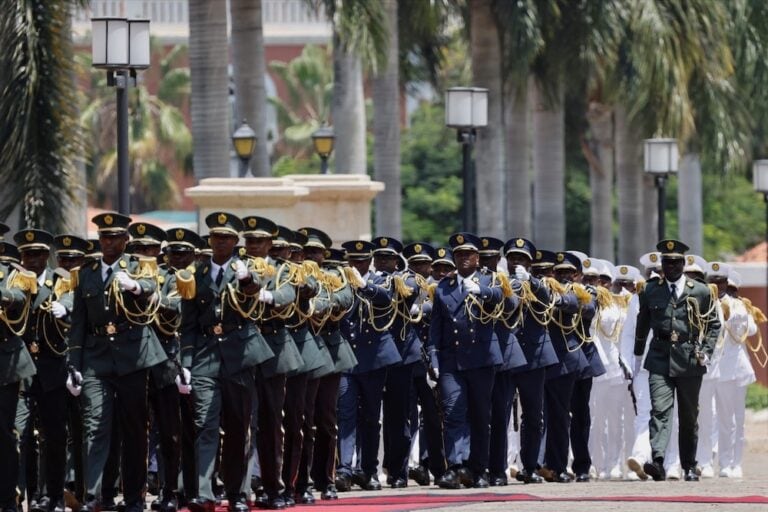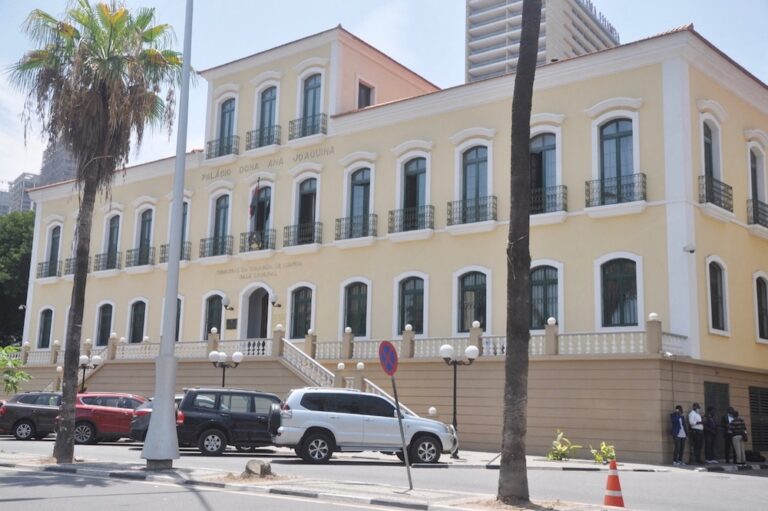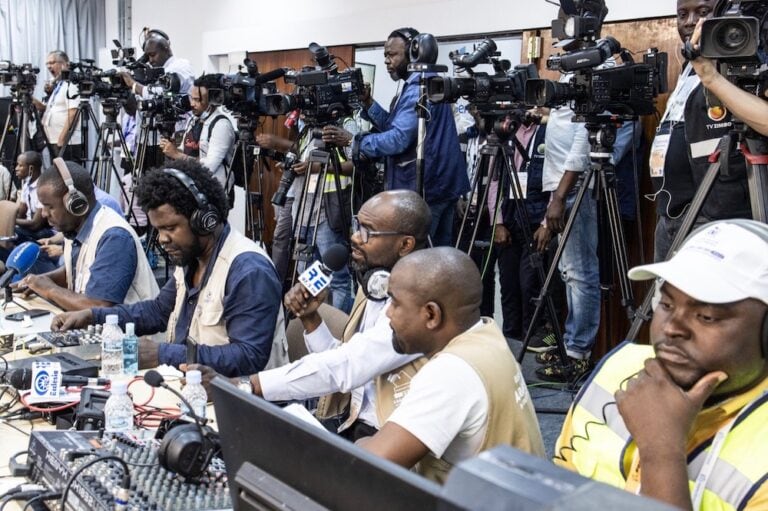On 23 November 2013, presidential guards in Luanda arrested opposition coalition activists who were putting posters on walls, and shot and killed 28-year-old Manuel de Carvalho, after the group was taken into custody.
Angolan authorities should fully investigate the killing of an opposition activist by presidential guards in Luanda on November 23, 2013, Human Rights Watch said today. The authorities should also investigate arbitrary arrests and the alleged use of excessive force to disperse an opposition party protest that day, and the mistreatment of a human rights lawyer.
On November 22, citing security reasons, the Interior Ministry banned a National Union for the Total Independence of Angola (UNITA) protest planned for November 23, which had been announced on November 15. The protest was organized to call for justice for António Alves Kamulingue and Isaías Cassule, two protest organizers who had been abducted in May 2012. A recently leaked internal government report said that Angolan security forces had tortured and killed them.
“The government’s killing of an activist and the mass arrests and dispersal with teargas of peaceful protesters is only increasing public discontent,” said Leslie Lefkow, deputy Africa director at Human Rights Watch. “Opposition parties and activists have every right to peacefully protest alleged murders by security forces and to call for justice.”
On the day of the protest police arrested hundreds of opposition activists, including a member of parliament of the opposition coalition Broad Convergence for Angola’s Salvation – Electoral Coalition (CASA-CE) and other leaders, in some cases mistreating people arrested. In Luanda, the capital, at about at 1:30 a.m., presidential guards arrested opposition coalition activists who were putting posters on walls, and shot and killed 28-year-old Manuel de Carvalho, an opposition activist known as “Ganga,” after the group was taken into custody.
Since March 2011, the Angolan authorities have repeatedly used unnecessary and excessive force, arbitrary arrests, harassment, and intimidation against organizers, participants, and observers of antigovernment protests.
State-owned media characterized the recent opposition protests as a threat to peace in the days leading up to the November 23 protest. That rhetoric is fuelling uncertainty, intimidation, and fear among the general population, Human Rights Watch said. The ruling Movement for the Liberation of Angola (MPLA), in power since 1975, and the MPLA-controlled state media accused UNITA of trying to “create chaos” and of “preparing a new civil war.”
The authorities allowed a “march for stability” in Luanda organized by a group called “Friends of the Good and Peace,” on November 23. In October the group had organized a march in support of President José Eduardo Dos Santos.
UNITA announced that its November 23 protest would proceed despite the ban, and the opposition coalition CASA-CE joined the protest preparations. Angolan media reported that in the early hours of November 23, in several provincial towns and Luanda, police broke into and in some cases ransacked the offices of UNITA and the opposition coalition and seized party material.
The police stated on November 24 that 292 opposition activists had been arrested across the country and released. They justified the presidential guards’ arrests of the opposition coalition activists on November 23, alleging that the activists were distributing “subversive and offensive propaganda posters” in “violation of the security parameter of the presidential palace.” The police deplored the killing of Ganga as an “unhappy incident,” saying it happened when he tried to escape.
“There is no justification for killing an unarmed man in custody,” Lefkow said. “The president should fully investigate his guard for this killing, and bring to justice all those responsible, including the officers.”
Killing of an Activist
Human Rights Watch spoke with two activists who witnessed the shooting of Ganga. Both said they were part of a group of eight activists who were putting up CASA-CE posters calling for justice for Cassule and Kamulingue on the wall of the sports stadium “Coqueiros” in a side street near the presidential palace, when a patrol of presidential guards arrested them. The witnesses said the presidential guards drew their guns and confiscated their phones, ordered them to wait, then took them in a military vehicle to a presidential guards’ unit near the presidential palace. One of the activists told Human Rights Watch:
We explained that we were putting posters on the wall and were doing this in a peaceful way. The presidential guards said this was not a place to put posters at night, and there was a police note forbidding this. They should have called the police, but instead they took us to the presidential guard unit. They said, “You will see!” The boys were full of fear and thought we were going to be killed. When we arrived at the unit Ganga precipitously jumped out of the car. They immediately shot at him twice. Then the car entered [into the presidential guard unit], they took pictures of us and later handed us over to the police.
Another detained activist independently confirmed the circumstances of Ganga’s death:
Ganga was afraid. We were all afraid. They told us, “You will see!” When we arrived at the unit, one guard entered, and Ganga jumped from the van. They immediately shot at him and he fell down. We entered the unit. The guards slapped us in the face. They asked us if we had received money to do this and warned that doing politics carries the risk of being killed.
Efforts to Block Protesters
On the morning of November 23, the authorities deployed a large number of armed rapid intervention and regular police, horse and dog squads, and police and military helicopters at the starting point of the protest, Santana cemetery. Later police shot teargas into the crowd to disperse several hundred protesters who were shouting “Violence No!” injuring some protesters and causing others to faint, and blocked the street to prevent the crowd from marching. Around noon, the UNITA leader, Isaias Samakuva, who was himself affected by teargas, called off the demonstration.
A journalist at the scene told Human Rights Watch:
The climate was completely hostile. There were dogs, horses, antiriot police, water cannon vans, regular police, and two helicopters… The police helicopter had two agents aiming weapons at the crowd. It was an environment of terror, intimidation, fear, and direct pressure from the police which prevented any gathering of people.
Mistreatment of a Lawyer
Human Rights Watch was unable to corroborate reports of serious injuries and further deaths resulting from excessive use of force during the protest. However, Human Rights Watch found that police stopped, mistreated, and threatened with death Zola Bambi, a lawyer working for the legal aid organization Mãos Livres.
Bambi told Human Rights Watch he went near Santana cemetery to contact one of his clients, and was first beaten by four police agents near the cemetery at 10:30 a.m. He said the agents let him go once they learned that he was a lawyer. He said he lodged a complaint at the police station immediately afterward, went home, then returned to the demonstration site around 2 p.m. to pick up his phone, which he had left with a colleague. He said rapid intervention police agents then arrested him and put him in a police van, where they mistreated and threatened him:
After having picked up my phone I crossed the street to get to my car. A group of over 15 rapid intervention police agents surrounded and stopped me and my nephew and ordered me to hand in my phone. I explained that I was a lawyer and didn’t have any obligation to give them my phone. More and more people watched the scene.
After a while they forced us into a van. There, they kicked me, and two agents beat me on my head with a baton and other objects. There were teargas bottles, iron bars, and other weapons in the car. They said “You, lawyers who defend those who want to destabilize the country, deserve to be punished!” The car was moving around while they hit me. The group leader cuffed my hands on the back very tightly and ordered me to keep my head down.
I didn’t know if I was going to leave alive. They threatened: “Your family will miss you! You are playing with your life.” The group leader said: “Here in Angola we don’t talk about laws, we follow orders.” After about 45 minutes, the car stopped and they ordered me to leave. “This time you got away; next time you’ll see,” the agent said.


